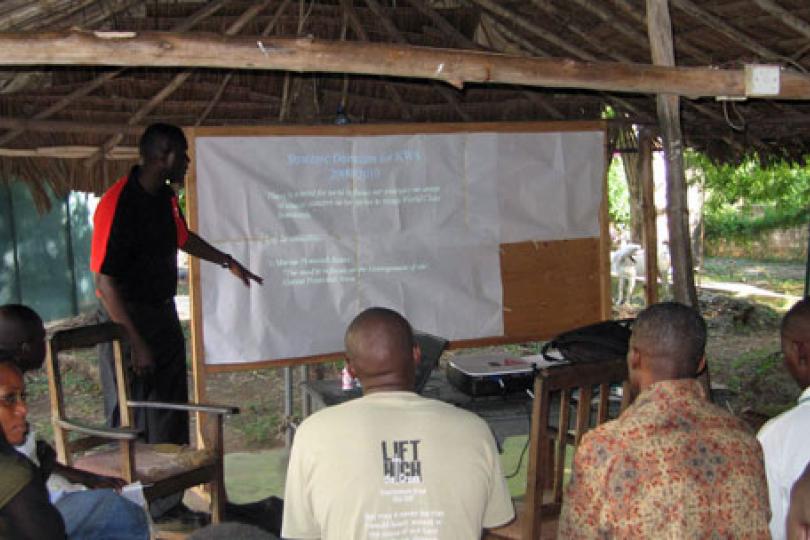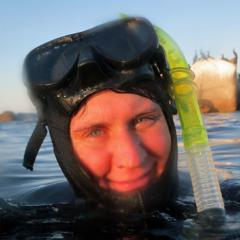Translating Science Into Action: The Mombasa Marine Park, Kenya
The most prevalent threats to reef ecosystems in Kenya are over-fishing, pollution and climate change. Kenya is one of four African nations with marine protected areas (MPAs) that exclude fishing within protected area boundaries. However, management plans for marine protected areas in Kenya lack measures to respond to threats emanating from outside of the MPA boundaries. Jennifer was hired to develop a new management system that offers strategies for adapting management objectives to respond to both internal and external threats. The program she helped the Kenya Wildlife Service to develop and implement allows managers to actively respond to threats (including climate change) by directly linking scientific monitoring with appropriate management. Jennifer was engaged in the project primarily as a scientist, but found that working with the community to garner residents’ interest and understanding played a pivotal role in the success of the project.
Jennifer’s association with the KWS started while she was in her PhD program at UC Santa Cruz, where she partnered with the KWS in designing her doctoral research. Ultimately, she was asked by the KWS marine research office to develop a more proactive management system for the parks. According to Jennifer, “In order to carry out this important, but ambitious, project, I needed a mentor. I formed a partnership with Dr. Dan Brumbaugh, Senior Conservation Scientist at the American Museum of Natural History’s Center for Biodiversity and Conservation. Funding from the Switzer Leadership Grant enabled me to further develop the partnership between the Museum and the KWS.”
Adaptive management is a decision making process that involves the continual monitoring of a resource to determine whether management objectives are being met. An essential part of the adaptive management program was training KWS staff in scientific monitoring techniques. To increase KWS staff capacity for the monitoring, Jennifer designed a four-week intensive training course in reef ecology, management principles and data collection. She engaged park staff in developing and implementing sound, low cost ecological monitoring protocols, and worked with KWS wardens and the park community to integrate the data from collaborating researchers and the monitoring program into their management decision-making framework. KWS staff collected data on sea turtle nesting activity, human use of the beach (including trash counts and beach slope measurements), and coral and seagrass surveys, for example.
During the course of the training, park rangers indicated to Jennifer that they had never been taught about marine ecology or management and that they felt under-utilized in their jobs. In pre-training testing, she discovered that few rangers knew basic information about the marine park, which was a significant disadvantage as the rangers were the main point of contact with residents and community members. Jennifer’s training program included a forum for rangers to voice concerns about park conservation and management, and to have their ideas considered by management – an entirely new concept in the Park. The rangers participated in designing ecological and social monitoring protocols, and initiated outreach to the community about issues such as beach trash. The community, in turn, began to get excited about ways to work together to address some of the issues like beach trash and pollution by, for example, committing to eliminating the use of plastic bags for food sales, organizing regular beach clean-ups, and transforming a beach dumping ground into a park with newly planted trees. Rangers are now collecting and entering data on key ecological and human use indicators. Although scientific research programs such as the Wildlife Conservation Society’s Coral Reef Conservation Project are contributing most of the ecological data, park rangers are now able to enter the data for analysis, and fill the data gaps surrounding human use patterns in and around the park.
The Adaptive Management Program has become a model in Kenya for applying science to conservation management. The KWS is now extending Jennifer’s program to three other MPAs and is considering how the program can be adapted for use in its terrestrial national parks. Through her work educating park rangers on data collection, the rangers’ capacity to evaluate and manage the Park has been greatly improved. Ranger Tim Ikime said, “I wish that all KWS staff could take this training course. The information we gained at the Mombasa Marine Park through the new program should be required knowledge for all park staff, including senior officers.” Furthermore, local fishermen from surrounding areas have voluntarily decided to train with KWS Mombasa staff in monitoring and management to evaluate the health of their own fishing grounds. Arthur Tuda, Senior Warden of the Mombasa Marine Park says of this program, “We now manage the MPA with a purpose knowing where we have come from, where we are and where we need to be''.
Jennifer left Kenya in 2010 and returned to Santa Cruz to continue her reef conservation research through a post-doctoral position at the National Center for Ecological Analysis and Synthesis. However, KWS staff members have continued the monitoring and public engagement in her absence. Rangers are now being sent to other MPAs in Kenya to train their colleagues, thereby expanding the Adaptive Management Program to other settings. KWS is now fully funding the program on its own and providing incentives to rangers to achieve program objectives.
Because the program is intended to be autonomous and maintain itself into the future, Jennifer facilitated a collaboration with a local Kenyan non-profit called CORDIO East Africa. Its local director, Dr. David Obura, will continue to help KWS staff with data entry and analysis. Dr. Obura, an internationally recognized scientist, indicated after working with the park rangers on this project, “The more experienced rangers instructed the others who assisted in the various components. The methods were also implemented very well, and I was impressed with the program's potential.”
What’s Next
Although Jennifer is no longer physically present in Kenya, she remains actively involved with the Adaptive Management Program. She remains in close contact with several of the rangers, the park warden, Dr. Dan Brumbaugh from the American Museum of Natural History, and with Dr. Obura from CORDIO. She is hoping she can translate the techniques and methods used in Kenya with a new partnership she is forming with the Museum and an NGO called NaturalEquity, based in the U.S. but operating primarily in Micronesia. Through this intended collaboration, Jennifer will work with communities that have established locally managed marine areas in Pacific Micronesia , helping them to use science to evaluate the effectiveness of their marine conservation and management initiatives.
Jennifer’s work in Kenya received media attention throughout the western Indian Ocean in conservation newsletters, and has received extensive television and newspaper coverage in Kenya. (/news/fellows/jennifer-oleary-receives-national-recognition-kenya)
Click here for Jennifer's website to read more about her work.
Dr. Jennifer O’Leary received her undergraduate degree at Tufts University in Environmental Science. She has worked in conservation and management for California’s state and county agencies, including as a marine biologist with the California Department of Fish and Game where she co-authored a management plan for seven species of abalone. Jennifer did her graduate work at UC Santa Cruz where she focused on the effects of fishing on tropical reef systems. Jennifer is currently a postdoctoral researcher at the National Center for Ecological Analysis and Synthesis where she is helping develop a global model of ocean health.

